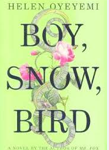 Race and sex should be easy categories to check off, immutable characteristics that everyone understands. But in fact even those categories turn out to be more fluid than we had understood (see, for example, Jan Morris’ terrific memoir “Conundrum” about her sex change, reviewed here.) The three main characters of Helen Oyeyemi’s engaging new novel “Boy, Snow, Bird” are a girl named Boy, a girl named Snow, and a girl named Bird. It’s a central strength of the novel that each is more than she appears, and that together they teach us something new about the classifications that half a century of law and usage have made of our natures.
Race and sex should be easy categories to check off, immutable characteristics that everyone understands. But in fact even those categories turn out to be more fluid than we had understood (see, for example, Jan Morris’ terrific memoir “Conundrum” about her sex change, reviewed here.) The three main characters of Helen Oyeyemi’s engaging new novel “Boy, Snow, Bird” are a girl named Boy, a girl named Snow, and a girl named Bird. It’s a central strength of the novel that each is more than she appears, and that together they teach us something new about the classifications that half a century of law and usage have made of our natures.
In the early 1950s, Boy Novak, who is about 18, runs away from her home after her father, a rat catcher, abuses and humiliates her one time too many. Her mother died long ago, and she is leaving behind only her friend Charlie, who might or might not love her. She fetches up in a small town in central Massachusetts, where she lives in a boarding house and makes enough money doing odd jobs to survive – and even pay back the money she stole from her father. She becomes friends with two of the other young women in the boarding house, particularly Mia, a journalist. Through them she meets Arturo Whitman, the widowed father of Snow. He’s a history teacher turned jewelry-maker, and he gives Boy a gift of a bracelet: a gold snake that winds up her arm.
Appearances here are deceiving. The first hint comes when Boy meets Arturo’s mother, sister and daughter. Snow’s other grandmother, Agnes Miller, is also there. The room is dark, and there are areas of conversation that are clearly but silently declared out of bounds. The second hint comes when Arturo’s other sister, Clara, sends a gift to celebrate Arturo’s wedding to Boy. The gift is the first time Boy learns of Clara’s existence. Clara and her mother don’t get along, Arturo tells Boy. But it’s not because of anything that Clara has done, really. It’s because of who Clara is.
The language of Arturo’s Massachusetts family carried a few tones of the south. At first the reader winces at the anachronisms, but this book is carefully crafted, and the language is another clue. When Boy and Arturo have a daughter, Bird, who is born “with a suntan,” the secret is out. The Whitmans and the Millers are emigres from Mississippi. They are also passing as white – during the move north they decided to uncheck the race box. Hence the dark rooms and conversational shutdowns. Clara’s fault, if it is one, is that she has been born with dark skin. Keeping the secret in the nineteen fifties leads to some grotesque behavior, but as Snow later says,
. . . you can’t feel nauseated by the Whitmans and the Millers without feeling nauseated by the kind of world that’s rewarded them for adapting to it like this.
This is only the beginning of the revelations and understanding that Boy, Snow, and Bird come to over the 15 or so years covered by the novel. The reader becomes enmeshed in this family drama, sharing Boy’s and Bird’s need to know, to understand, to manage. Everyone pays a price when the secrets are revealed.
The complex racial and social themes provide a persuasive background for this deeply felt story of family life. Do you agree? Let us know in the comments.
Have a book you want me to know about? Email me at asbowie@gmail.com. I also blog about metrics at asbowie.blogspot.com.
